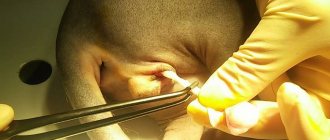Castration of animals requires a fairly strict time frame during which removal of the gonads is most effective and less traumatic. It is a mistake to imagine a pet’s body as a mechanism whose operation can be interfered with at any time. The physiology of cats suggests a fixed age that is best suited for castration. Being late or being too hasty in regards to this operation can lead to dire consequences, so every owner of a furry friend should know the answer to the question at what age cats are neutered.
At what age are cats neutered?
Reasons for castration
The main purpose of the operation is to correct sexual behavior. A growing kitten becomes nervous and irritable. He marks the corners of the apartment with urine, meows loudly, and tries to find the cat.
This behavior is caused by the onset of puberty. The cat pesters its owners and suffers itself. But the main danger awaits the cat on the street. He may get lost or be seriously injured in a fight with rivals.
Castration has many advantages:
- Prevention of sexual diseases.
- Life expectancy increases
- Lack of desire to mark territory
Minuses:
- Possibility of postoperative complications
- Weight gain.
- Risk of developing genitourinary diseases
A timely operation will be effective and will not lead to negative consequences for your pet.
Postoperative diet
After castration, cats' hormonal levels and the process of digesting food change. Neutered animals require 25–30% less energy, so it is necessary to reconsider the pet’s diet. It needs to be changed immediately after surgery.
Be sure to consult with your veterinarian regarding post-operative nutrition.
Cats compensate for the loss of sexual instinct with an increased craving for food. This can lead to obesity. Don't follow your cat's lead when he asks for more. Reduce the usual daily amount of feed by 25% and divide into several portions.
After surgery, cats need to be given special food.
If a cat does not eat properly, two problems can arise: obesity and urolithiasis. The narrowed urethra after castration interferes with the natural passage of stones. Products containing magnesium, calcium and phosphorus should be excluded from the diet. These substances cause the appearance of stones in the ureter. Remove fish from your diet. The basis of nutrition should be a vegetable and meat menu.
Components that cleanse urine of excess substances are contained in specialized food for neutered cats. Find the best food for your pet at your veterinary pharmacy.
What to do to prevent obesity
To avoid problems with excess weight, it is important to closely monitor your pet:
- Weigh the animal regularly. Make sure that the cat does not gain more than 20% of its previous weight. Obesity can lead not only to problems with urination, but also to the development of diabetes, so if your animal begins to gain extra pounds, be sure to consult a veterinarian.
After surgery, the cat's weight should not increase by more than 20%
- Find out your pet's energy needs. Remember that a low-active cat should consume no more than 60 kcal per day per 1 kg of live weight.
- Buy only high-quality feed. If an animal refuses food, fat reserves in the body begin to accumulate in the liver, which causes degenerative processes. Low-calorie food must have good taste in order to stimulate the animal's appetite.
- Play more outdoor games with your pet. Buy new interesting toys. The motto for a neutered cat: diet and exercise.
Games will help your cat stay fit
Regular dry cat food is not recommended; it contains added by-products, sugar substitutes and preservatives.
Determining whether a cat is ready for castration
How to determine the age for castration of a cat? According to doctors, the procedure should be performed upon reaching puberty or full anatomical maturity. This period is different for different breeds.
There are no clearly defined limits on how long cats can be castrated.
The animal is ready for castration if several conditions are met:
- Puberty has recently begun. The influence of sex hormones on the development of an animal’s body is not so great.
- Organs and systems have finally formed. Castration slows down metabolic processes.
- The testes have descended from the abdominal cavity or inguinal ring. The owner can gently feel the cat's testicles. They should descend into the scrotum.
- Optimal age for castration
The most favorable age for castration of a cat is 7 to 9 months.
Causes:
- The kitten has gained enough weight
- The animal's body is formed, but puberty is not over. Hormones are produced so far only in the testes.
After 12 months, sex hormones begin to be produced by the adrenal glands and pituitary gland. It will be more difficult to correct sexual behavior.
It is better to castrate a cat that did not take part in mating. Otherwise, the desire for sexual intercourse may persist.
Differences between sterilization of young and adult individuals
When a female is spayed before her first heat, there is a high probability that only her ovaries will be removed during the operation. This operation is called oophorectomy. If at the time of the operation the cat was already in heat, or even pregnant and giving birth, then the uterus can be removed along with the ovaries during the operation. This procedure is called ovariohysterectomy.
According to the advice of veterinarians, it is better to remove the uterus during sterilization, because over time this organ can begin to become inflamed, which will lead to disastrous consequences. In order for the uterus to be removed along with the ovaries, it is not necessary to wait for the first heat. But before the operation, you need to consult a veterinarian and resolve this issue together.
There are cases where age does not play a role in sterilization. Most often this happens when surgery is prescribed for medical reasons. In this case, it is necessary to undergo tests to check the condition of the animal.
Early castration
What age is considered early for castration of cats? From 8 to 16 weeks. Previously, doctors refused to perform manipulation at a young age. Now in Russia there are clinics and breeders who recommend defertilizing kittens in childhood.
Main reasons:
- Failure to meet breed standards.
- Breeders castrate kittens that are guaranteed to have no breeding value.
- Developmental deviation.
- New growth in the scrotum, genital injuries and others.
Pros:
- The genitals of kittens are smaller than those of adults. This means that fewer stitches will be required and the duration of the procedure is reduced.
- Less dosage of drugs and anesthesia
- Reduces the risk of bleeding
- Recovery after surgery takes less time
- Behavioral problems do not arise - marks in the wrong places, aggression.
Flaws:
- Cats become more cowardly and timid
- Increased likelihood of obesity
- In our country, veterinarians do not encourage castration at this age.
Preparation period
Mandatory conditions for preparing a cat for sterilization are:
- 12 hour diet. This is due to the fact that anesthesia can cause the animal to vomit if there is food in the cat’s stomach. Aspiration of vomit causes a dangerous disease - aspiration pneumonia;
- The cat should not be given water to drink within 2–3 hours;
- treatment for worms. Carried out 10 days before sterilization;
- vaccinations. If the animal is not vaccinated, there is a risk of contracting an infectious disease after surgery.
Castration of mature cats
Between the ages of 1 and 2 years. If for some reason it was not possible to castrate the cat earlier, then you can castrate the cat a year. Keep in mind that puberty has largely ended and the pituitary gland has begun to produce additional hormones.
When a cat is castrated a year, the hormonal levels can remain high for a long time - up to 6 months. And the owners’ hopes for an instant castration effect may not come true.
The operation is performed under general anesthesia.
Pros:
- The cat stops experiencing sexual desire
- The character becomes calmer
Minuses:
- Excess weight. But animals at this age are still growing, so the diet is not adjusted radically.
- The need to mate remains for some time. After castration, the cat is infertile, so there is no need to worry about possible offspring.
Consequences
Castration of cats is considered an easy operation; after it, dangerous consequences and complications rarely arise. But no veterinarian can guarantee with maximum accuracy that this surgical intervention will go smoothly. It all depends on the individual characteristics of the animal’s body and on the implementation of important recommendations in the postoperative period.
Cats may exhibit the following physiological disorders:
- internal bleeding. This complication occurs very rarely, but still sometimes occurs. Usually during this procedure the cat is in a lethargic and passive state after surgery. If you want to pick him up or stroke him, this will cause him severe pain. Pay attention to the appearance of the oral mucosa; if it is pale, contact your veterinarian immediately;
- the presence of infection in the wound area. Typically, for the first 3-4 days after surgery, there may be redness and swelling in the area around the incision site. If the inflammatory process intensifies, this indicates that an infection has entered the wound area; be sure to visit a veterinarian;
- obesity. Usually, anesthesia causes hormonal imbalance and slows down metabolism. After the operation, the condition returns to normal. But sometimes it can get worse and cause weight gain. In these cases, you should consult a veterinarian. He will recommend the right treatment.
- constipation, in the first days after castration.
Find out more about the indications and contraindications for cat castration surgery>>>
From 2-5 years
It happens that a cat ends up with its owners as an adult. If there are no contraindications, cats can be neutered at this age. You shouldn't expect much effect from the manipulation. The cat's body developed under the influence of sex hormones.
Castration of an adult pet will not solve problems with marking the premises with urine, attempts to escape from the house and regular howling. Unfortunately, it is almost impossible to correct the habits and behavior of an older cat.
The disadvantages outweigh the benefits of the intervention
- Risk of physical inactivity.
- Gaining excess weight. Corrected by a specially selected diet
The operation is performed only under general anesthesia.
Possible complications after surgery
Surgical removal of the testes is a fairly simple operation, but in rare cases complications can occur. Veterinarians usually assess the animal’s health before the procedure begins and inform the owner about the possible development of the following side effects:
- licking of incisions on the scrotum and inflammation of wounds
- deterioration of general condition
In order to prevent the development of complications, it is necessary to monitor the cat during the first 24 hours after surgery and follow the recommendations of the veterinarian.











